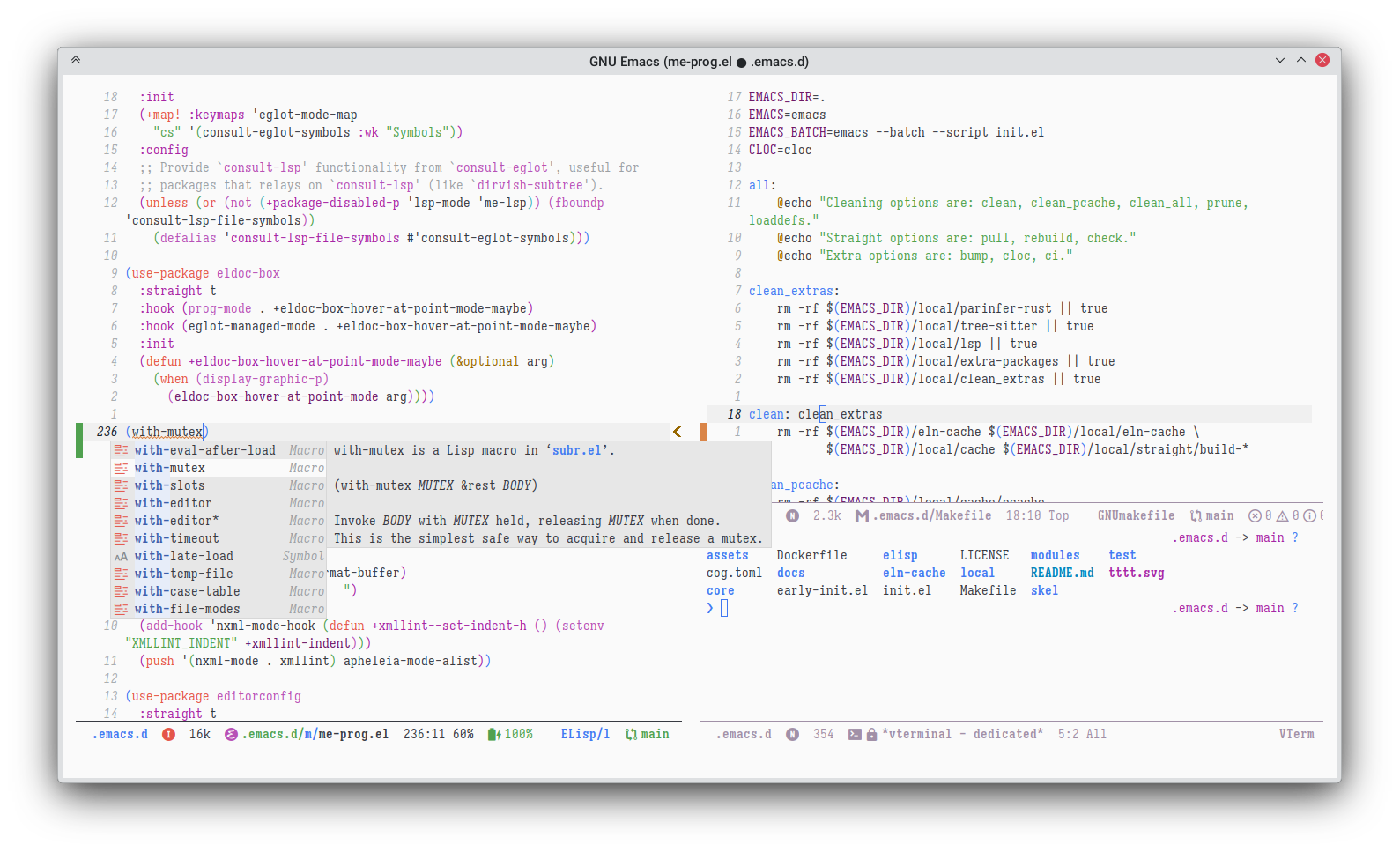MinEmacs is a complete and fast Emacs configuration framework.
Caution
Please note that this minemacs-ng branch is under an active rewrite. The new
generation of this framework will not be fully compatible with the initial one
since it has multiple breaking changes compared to the legacy branch. This
includes dropping the support of Evil and General (still, enabling the
obsolete/me-evil should restore the previous Evil/General based experience),
among other things.
Long story short, I'm relaying on Emacs for my everyday's work, so I needed a fast and stable configuration that fits my needs. MinEmacs is changing constantly, please refer to the change log for more information.
Note
Please note that I have no intent or availability to create an alternative to Doom Emacs or Spacemacs. While I find joy (like every other Emacser out there) in tinkering with Emacs, MinEmacs remains just a tool that I use in my everyday work, and that I like to share with other Emacsers.
Open a shell and run:
git clone --recursive https://github.com/abougouffa/minemacs.git ~/.emacs.d && emacsBy executing this command, the repository will be cloned, and Emacs will be
launched. During the initial run, Emacs will automatically install the necessary
packages. You might need to run M-x minemacs-run-build-functions when Emacs
loads up to install some extra stuff (build some libraries, install Nerd Fonts,
etc.)
Important
Please note that I'm using a fresh Emacs 29.4.50 (recommended version) built
from the emacs-29 branch mainly on two machines, one based on Manjaro Linux
and the other on (the quite old) Debian 10. However, I have set up some basic
Github CI actions that
automatically test running this configuration on Emacs 29 and 30 in Ubuntu
Linux
and
MacOS
and on Emacs 29 in
Windows.
These actions ensure that MinEmacs is "runnable" on these systems; with all
its modules enabled. However, more testing should be done to validate the
configuration as a whole on systems other than Linux.
To personalize MinEmacs, you can add a specific set of files within the default
user configuration directory, which is located by default at ~/.minemacs.d/ or
.emacs.d/user-config/ (the first to be found). However, if you prefer to use a
different directory, you have the flexibility to do so by setting the
MINEMACSDIR environment variable.
There are two main files that can be added in the ~/.minemacs.d directory:
- The
~/.minemacs.d/modules.elfile contains a list of enabled modules and/or a list of disabled packages (minemacs-modulesandminemacs-disabled-packagescan be set in this file). So if you want to enable a module (ex.me-prog) but you need to exclude a particular package (ex.ts-movement), you can add the latter tominemacs-disabled-packages. - The
~/.minemacs.d/config.elfile contains the user configuration and customization, you can think of it as yourinit.el, which gets loaded at the end of MinEmacs'init.el!
This repository contains skeleton files for modules.el and
config.el (under skel/). We highly recommend
following the same structure as in the skeleton files, specially the use of
with-eval-after-load and use-package instead of using require directly
(require loads the packages immediately, which increases the startup time of
Emacs).
In my workflow, I use mainly the same configuration files across all my machines (which, following the tradition, are shared in my dotfiles repository). However, I have some machine-specific (local) configurations that contain some private and machine-specific configurations. For example, I use them to overwrite the email address on my workstation, to setup my Email accounts, to setup Forge and Jira integration in my workstation, and so on.
For this purpose, MinEmacs will also check for files in
~/.minemacs.d/local/{early-config,init-tweaks,modules,config}.el and load
them, after the ~/.minemacs.d/{early-config,init-tweaks,modules,config}.el if
they exists.
MinEmacs provides also some advanced customization files, these files can be used to tweak MinEmacs' behavior, add some early initialization code, make MinEmacs runnable on older Emacs versions, etc.
- The
~/.minemacs.d/early-config.elfile is loaded at the end of MinEmacs'early-init.el. You can use it to set up some early stuff like tweaking the UI, overwrite the variables set by MinEmacs in~/.emacs.d/early-init.el, and so on. - The
~/.minemacs.d/init-tweaks.elfile is loaded at an early stage of theinit.elfile. You can use it to do some useful stuff before MinEmacs starts to customize packages and load modules. See the comments ininit.elfor more information.
You can customize MinEmacs' behavior via some environment variables.
MINEMACS_DIRorMINEMACSDIR: Path for MinEmacs user configuration directory, if not set,~/.minemacs.d/is used.MINEMACS_MSG_LEVEL: Change message log level, from 1 (only errors) to 4 (all messages).MINEMACS_VERBOSE: Be more verbose (useful for debugging).MINEMACS_DEBUG: Enable debugging at startup (and be verbose).MINEMACS_ALPHA: Set framebackground-alphato percentage (value from 0 to 100).MINEMACS_NOT_LAZY: Load lazy packages immediately after loading Emacs.MINEMACS_ALWAYS_DEMAND: Load all packages immediately (this works by settinguse-package-always-demandtotanduse-package-always-defertonil(by default, MinEmacs setsuse-packageto always defer, unless explicit:demandis added).MINEMACS_IGNORE_USER_CONFIG: space-separated values, used to disables loading~/.minemacs.d/<file>.eluser configuration files. Accepted values for<file>are:early-config,init-tweaks,modules,config,local/early-config,local/init-tweaks,local/modulesandlocal/config. Useallto disable all user configuration files.MINEMACS_LOAD_ALL_MODULES: Load all modules (without taking~/.minemacs.d/modules.elinto account).MINEMACS_BENCHMARK: Run a benchmark at initialization of Emacs (usingbenchmark-init.el) and display the results after startup (including lazy packages).MINEMACS_NO_PROXIES: Set if you haveminemacs-proxiessetup in yourearly-config.elbut you want to start Emacs without passing by these proxies (useful if you use some proxies for workplace but you want Emacs to start without passing by them to be able to download packages).
For more information about customization variables, functions and commands defined by MinEmacs, you can refer to the documentation generated from the source code.
If you experienced an issue with MinEmacs, you can take a look at the FAQ, consult the discussions, check open issues or open a new one.

